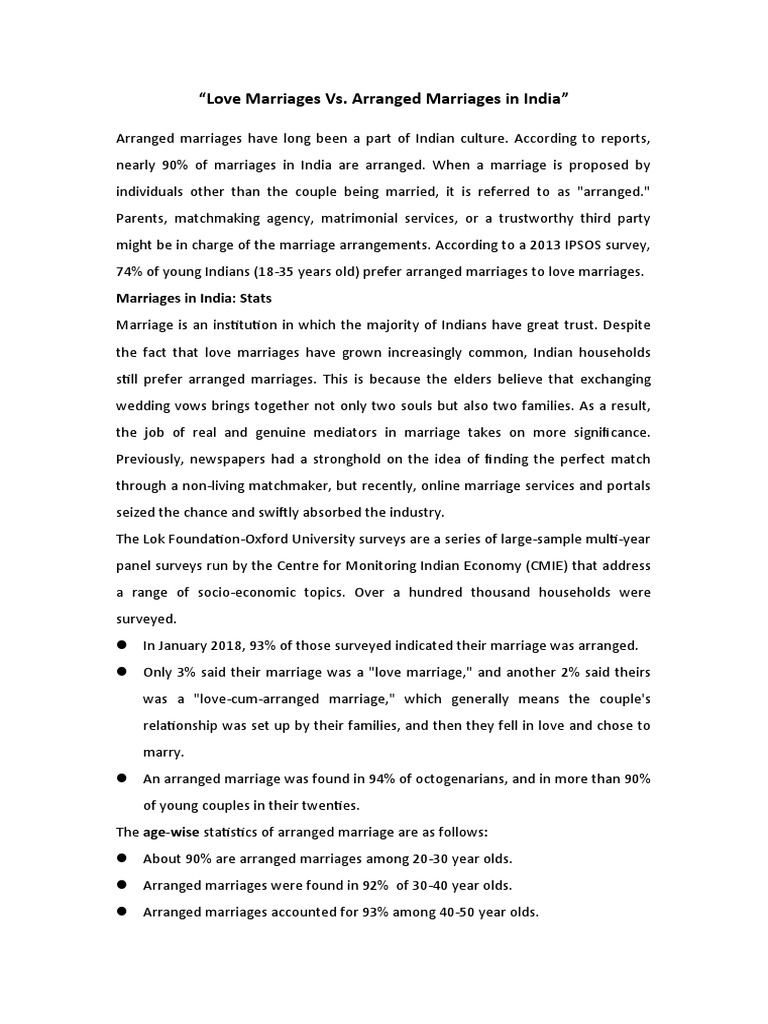The institutions of marriage, both arranged and love-based, are akin to two distinct yet intertwining strands of a cultural tapestry. Each thread represents the values, beliefs, and expectations of the societies from which they originate. While arranged marriages often evoke images of cultural traditions and familial commitments, love marriages conjure visions of individual autonomy and emotional connection. This exploration delves into the juxtaposition of these two paradigms, illuminating the cultural choices at play and the ensuing evolution of societal norms.
Arranged marriages are often perceived as relics of conservative societies, where familial alliances are deemed paramount. In this context, marriage is less about individual choice and more about sociopolitical stratification. Families may orchestrate unions to bolster their socio-economic status or perpetuate cultural legacies. The metaphor of a well-planned garden is appropriate here: just as a gardener selectively chooses plants to cultivate a thriving ecosystem, so too do families select partners to fortify their social fabric.
The intrinsic value of arranged marriages lies in their foundational structure—often steeped in the wisdom of generations. Parents and elders draw upon their life experiences to guide the matchmaking process, thus embedding a generational continuity into the institution of marriage. Furthermore, arranged marriages can engender stability, as they assure compatibility not just between partners but between families. Such unions can create expansive networks of support, fostering communal bonds that lend strength to familial relationships. However, this linkage is not without its drawbacks; individuals may feel constrained by familial expectations, leading to psychological strains that can accompany such ties.
Conversely, love marriages are sometimes heralded as the epitome of individual freedom and romantic idealism. The notion that two individuals can autonomously choose their partners is captivating, likening love to a rose growing wild and unrestrained in a field. Here, love serves as the catalyst for union, transcending familial affiliations and traditions. However, this paradigm introduces a unique tapestry of complexity. While the emotional connections formed in love marriages can create profound relational intimacy, they also necessitate a degree of vulnerability that can lead to disillusionment.
The shifting landscape of marriage practices speaks to the profound currents of cultural relativism. As societies become increasingly globalized, the dichotomy between arranged and love marriages has prompted a reevaluation of cultural values. The rise of individualism, particularly in urban settings, has catalyzed a transformative shift toward love marriages, challenging entrenched norms surrounding familial authority. Nonetheless, the appeal of arranged marriages persists, particularly in communities where collective identity remains a cornerstone of social cohesion.
One must acknowledge that the perception of arranged and love marriages is not absolute; there exists a spectrum where the two coexist, intertwining like the delicate threads of a fine fabric. Individuals from arranged backgrounds may still cultivate love, while love marriages may occasionally draw upon familial input. This hybridization bespeaks a dynamic interplay between tradition and modernity, reflecting the ageless human pursuit of love and belonging.
Moreover, cultural relativism posits that no culture is inherently superior to another, emphasizing the necessity of contextual understanding. From this vantage point, one may argue that neither arrangement is without merit. Arranged marriages can offer stability, whereas love marriages may foster personal fulfillment. The ideal marriage, then, is an alchemical blend of both paradigms—where familial guidance coexists with profound emotional connection.
The global discourse around marriage is continually evolving. The advent of technology, social media, and burgeoning cross-cultural interactions has fostered dialogues that challenge antiquated beliefs around marital structures. In essence, this proliferation of ideas engenders an environment of choice, allowing individuals to carve their paths—so long as those paths remain respectful of cultural legacies.
In contemplating the future of marriage practices, one must consider the role of education and empowerment. Raising awareness regarding the socio-cultural ramifications of both arranged and love marriages can foster informed decision-making. As individuals navigate the intricacies of their choices, they become empowered arbiters of their destinies, positioning themselves within their cultural narratives.
In summation, the phenomena of arranged and love marriages encapsulate the multifaceted nature of intercultural dynamics. Each marriage type reflects distinct cultural values while collectively enriching the narrative of human relationships. The ongoing dialogue surrounding these practices elucidates the adaptability of cultural norms, serving as a reminder that love and partnership transcend boundaries, weaving an intricate tapestry of human experience. Ultimately, the choice between arranged and love marriages is deeply personal, reflecting individual values while resonating within broader cultural contexts.
